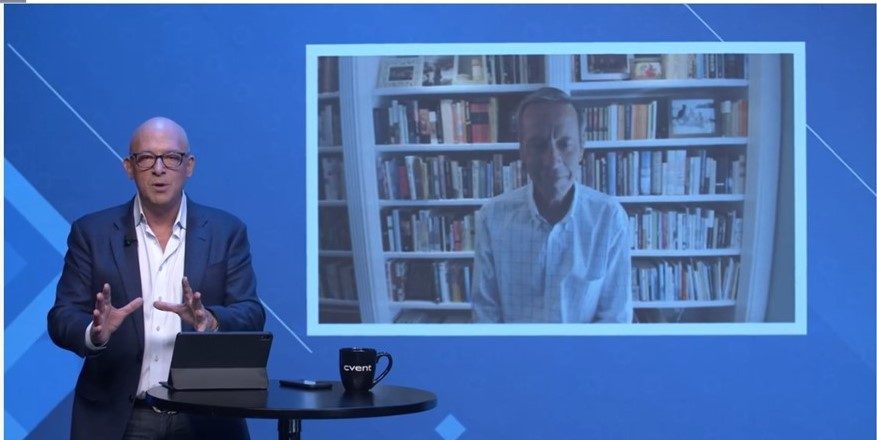By Kaitlin Dunn, Writer, Hospitality Sales & Marketing Association International (HSMAI)
Marriott President and CEO Arne Sorenson joined former stockbroker and author Mark Jeffries for a “fireside chat” during Cvent Connect on Aug. 26. Sorenson shared the challenges that he has faced on a personal level, as well as Marriott’s efforts in diversity and against coronavirus.
Sorenson has been mainly isolating in his home in Maryland since the pandemic began. He has been fighting a double battle — not just with coronavirus and lockdown but with chemotherapy treatments for pancreatic cancer, with which he was diagnosed a year and a half ago. In March, he shared a video encouraging Marriott employees to stay strong and offering hope that they would get through the pandemic together. “The video got a lot of play because I did it bald, which made what was already emotional much more personal,” Sorenson said. “One thing that I have learned is that there is nothing more important than being transparent and recognizing the challenge in front of us.”
Sorenson added that he is feeling better these days — and that his hair has finally grown back. “I feel great and am up for the challenge,” he said.
TRAVEL AND LEADERSHIP
After being cooped up for several months, Sorenson said, he is eagerly waiting for the day that he and his family can safely travel again — and he believes that many others are as well. “I am biased in favor of travel and the power we can derive from being together,” he said. “People yearn to see places, experience things, and gather together. Things will come back. It might be with a twist, but they will come back.”
One of the harder parts of his health battle, Sorenson said, is not being able to engage in person with employees in Marriott hotels. “I was walking through a neighborhood the other night and walked past one of our hotels,” he said. “Any normal time I would have gone in and shook everyone’s hand, but I didn’t. I’m not in a position where I can do that yet, but I can’t wait to get back to being able to come in unannounced, shake a hand, talk to them, and give a hug.”
Listening to one’s people, whether it be employees, senior leaders, or customers, is one of the most important qualities a leader can have, according to Sorenson, who was Chief Executive magazine’s CEO of the Year in 2019. “You have to keep your ears open,” he said. “By listening to them, you pull people into the team and let them tell you what they’re thinking. You can empathize with the perspectives people have. That’s the most important part of leadership.”
ON DIVERSITY
Coronavirus is not the only uphill battle the United States is facing. Calls for diversity and against racial inequality have been loud and strong in the wake of several high-profile police killings of African-Americans. In 2020, Marriott was named one of Forbes’ Top Workplaces for Diversity. At a time when many companies are under increased pressure to diversify the workplace, Marriott is helping lead the charge.
“We are a collection of people from everywhere of every faith, race, sexual preference, and identity,” Sorenson said. “We welcome a million people every day from every walk of life. How anyone in this industry can be anything other than fully embracing of diversity of inclusion is lost on me, because you can’t understand our business otherwise.”
Sorenson said that in the wake of George Floyd’s killing, Marriott has doubled down internally to increase diversity, and has been working externally as well to move the industry and the world forward. He noted that Marriott has had a committee for excellence focused on diversity for the past 20 years, more than half of the board is racially or gender diverse, and the management team is 50-percent women. “There are always advantages to having diverse voices in the room,” he said. “You have to make sure that you pull that together.”
LIFE AFTER CORONAVIRUS
As business starts to come back, Sorenson is relying on his teams to make good decisions. “The folks running the hotels know what they need to do,” he said. “We have to help them with the right tools, but if you give them a bit of leash, they’re going to do just fine.”
While Sorenson recognizes that everything from technology, to buffets, to meetings and events will change in significant ways after the worst of the pandemic is over, he firmly believes that business will return to hotels as soon as 2021. One step that could help attract individual business travelers, he said, is to start reopening offices as soon as it is safe to do that. “If we aren’t going to the office, our business partners don’t have anyone to come see,” he said. “We don’t want to take risks, but we’ve got to get offices open to get individual business travelers back on the road, and then groups will come behind that as confidence comes back.”
Group business is one area that Sorenson thinks will be permanently altered, as organizations have found ways to meet virtually and likely will include hybrid models in many future events. “The hybrid future is harder to deliver,” Sorenson said. “If you do both in-person and digital, you have to make sure the live experience is translated in a way that the digital audience doesn’t feel like second-class participants. We have to make it work for both.”
Everyone will be permanently changed by the pandemic, Sorenson said, calling it “the biggest economic or daily life disruption that anyone has faced in decades. Every one of us will have strong memories of where we were and how it hurt us and our livelihoods. The memories will influence the way we experience life afterward. We will see changes in travel, but people will want to see the world when it’s safe.”
